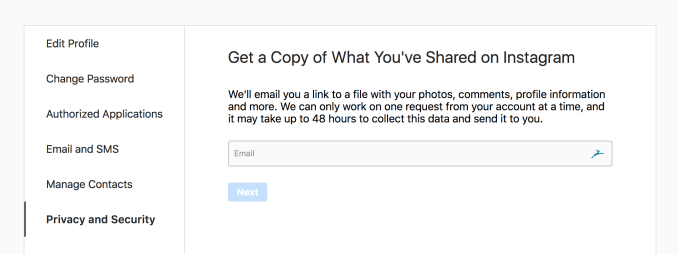April 24, 2018 at 09:44AM
via TechCrunch
Two weeks ago TechCrunch called on Instagram to build an equivalent to Facebook’s “Download Your Information feature so if you wanted to leave for another photo sharing network, you could. The next day it announced this tool would be coming and now TechCrunch has spotted it rolling out to users. Instagram’s “Data Download” feature can be accessed here or through the app’s privacy settings. It lets users export their photos, videos, archived Stories, profile, info, comments, and non-ephemeral messages, though it can take a few hours to days for your download to be ready.
An Instagram spokesperson now confirms to TechCrunch that “the Data Download tool is currently accessible to everyone on the web, but access via iOS and Android is still rolling out.” We’ll have more details on exactly what’s inside once my download is ready.
The tool’s launch is necessary for Instagram to comply with the data portability rule in European Union’s GDPR privacy law that goes into effect on May 25th. But it’s also a reasonable concession. Instagram has become the dominant image sharing social network with over 800 million users. It shouldn’t need to lock up users’ data in order to keep them around.
Instagram hasn’t been afraid to attack competitors and fight dirty. Most famously, it copied Snapchat’s Stories in August 2016, which now has over 300 million daily users — eclipsing the original. But it also cut off GIF-making app Phhhoto from its Find Friends feature, then swiftly cloned its core feature to launch Instagram Boomerang. Within a few years, Phhhoto had shut down its app.
If Instagram is going to ruthlessly clone and box out its competitors, it should also let users choose which they want to use. That’s tough if all your photos and videos are trapped inside another app. The tool could create a more level playing field for competition amongst photo apps.

It could also deter users from using sketchy third-party apps to scrape all their Instagram content. Since they typically require you to log in with your Instagram credentials, these put users at risk of being hacked or having their images used elsewhere without their consent. Considering Facebook launched its DYI tool in 2010, six years after the site launched, the fact that it took Instagram 8 years from launch to build this means it’s long overdue.
But with such strong network effect and its willingness to clone any popular potential rival, it may still take a miracle or a massive shift to a new computing platform for any app to dethrone Instagram.